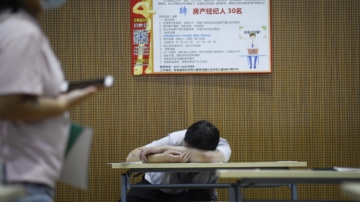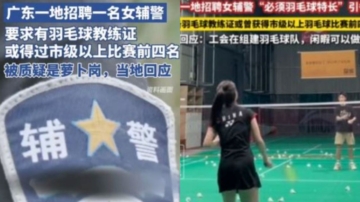【新唐人2013年10月15日訊】今年的「諾貝爾獎」已經陸續揭曉,中國科學家再度榜上無名,同時,大陸官方最新發佈的統計公報指稱,去年中國科研經費的投入,首次突破了萬億元大關。如此一筆巨款,有多少被真正用在了學術研究上?為何科研經費的投入與產出不成正比?一時間,社會各界對大陸科研經費去向的質疑聲不絕於耳。
據大陸官方發佈的《2012年全國科技經費投入統計公報》顯示,2012年中國共投入科研經費高達14298億元,投入總量居世界第三。
而另一項中國大陸科協的調查數據顯示,大陸科研資金用於項目本身僅佔40%左右,大量科研經費流失在項目之外。如此推算,一年之中,中國起碼有6000億的科研經費被揮霍一空。
浙江大學商學研究院院長 李志文:「它根本沒有甚麼像樣的規則,錢是很多的,但是沒有人真正懂這個錢該怎麼花。最後一堆爛帳報掉了上千萬,我看到直心痛啊,不可思議的心痛。」
據了解,中國大陸巨額的科研經費,掌握在少數不懂技術的行政主管部門官員手裡,造成種種權利尋租的怪象,經費的分配不是基於科研人員學術水平的優劣,而是看關係——有關係的項目,設計不好、造假也能過審批,課題沒完成也能過驗收﹔沒有關係的,課題再好也不容易上,導致優秀的科研團隊被排斥在外,二、三流甚至不入流的隊伍卻牟取了巨大利益。
原首都師範大學教育科學學院副教授李元華:「因為它被個別人或者所謂的學霸來把持,或者不學無術的一些人,他有權利了,他也在把持科研經費分配的時候,那麼,他就做了一些暗箱操作,或利益交換,大家真正目標就已經不是把科研經費用在科研上了,而是在關係,到最後怎麼應付把這個課題給結了,心思用在這了。」
從2006年至今曝光的科研經費黑幕來看,科研經費主要被「公家挪用」或「個人侵吞」,其中,「公家挪用」多用於發工資補貼、購車、買房、辦公傢俱、公款吃喝旅遊等方面。
如2010年至2012年,交通運輸部挪用1億8千6百萬元,用於職工工資補貼﹔2008年到2010年,貴州兩所高校挪用1745萬元經費,用於經適房建設﹔2011年,中科院城科會挪用26萬元,用來購買辦公傢俱﹔甚至山東教育廳所屬的13所大學9億4千萬元的科研經費,花在哪裡都說不清楚,直接填報「其他支出」。
山東大學退休教授 孫文廣:「我們過去也是這樣的,搞一個科學討論會,0550打著這個名義,那麼這個會址呢,就取這些或者到泰安哪、廬山哪、或者到海濱啊,用很少時間開會,多數時間就吃吃喝喝,遊山逛水,這種現象是相當不少的。」
科研經費除了被用在科研之外,甚至人員的吃喝拉撒睡、衣食住行,也都可以以科研經費的名義報銷。科研經費使用中的浪費黑洞令人怵目驚心。
李志文:「反正髒的很,拿到錢的大概都是沒學問的,因為很多海外真的有點學問的,在海外受到不錯的教育,激憤之下就出國了,再度出國,『公關』這個是大家都知道的所謂的機密,誰不要臉誰拿到錢最多。」
專家學者們指出,中國大陸對科研經費的分配不公及肆意揮霍,導致真正科研項目經費緊張,甚至無法進行,也導致很多真正有才華的、有能力的科研人員被徹底埋沒,或是隨波逐流、心灰意冷。
中國學者認為,並不是中國人沒有能力拿「諾貝爾獎」,而是真正的科學家都被腐敗的中共體制扼殺了。
採訪編輯/張天宇 後製/孫寧
China's Research Funding Exposed
This year's Nobel Prize results have been gradually published.
Chinese scientists once again did not make the list.
According to China's latest officially published data,
China ‘s research funding last year exceeded
one trillion yuan (over $160 billion) for the first time.
How much of this large sum of money is
actually spent on academic research?
Why is research funding and output not proportional?
People from all professions are questioning where
research funding actually ends up.
According to China's official report titled “The 2012 National
Science and Technology Funding Statistical Bulletin”
China invested a total of nearly 1.43 trillion yuan ($234 billion)
on research funding in 2012, the third highest in the world.
Another set of survey data from China 's Scientist Association
shows that 40% of research funds are used on projects,
while large amounts of funds are spent elsewhere.
It's estimated at least 600 billion yuan ($982 million)
of research funding is wasted in one year.
Li Zhiwen, dean at Zhejiang University School of Business:
"There are no decent rules.
There is lots of money, but no one really knows
how it should be spent.
Eventually it ends up as tens of millions in bad debt.
Seeing this pains me incredibly."
It is said that China's huge amount of research funding
is controlled by a small number of non-technical officials,
causing all sorts of power-chasing phenomena.
Funding is not being allocated based on the researchers' merits,
but by relationships and networking.
Projects with good networking would pass evaluations,
even with bad design or even counterfeiters.
Projects without connects will not be accepted
no matter how good they are.
This has led to excellent research teams getting excluded,
while mediocre or even unqualified teams get big benefits.
Li Yuanhua, former associate professor at Beijng
Normal University: "It's because the funding is controlled by
certain people such as school tyrants who allocate them
for secret use or in exchange for interests.
Their goal of using research funding is not scientific research,
but rather building relationship and closing down project."
Since 2006, reports on misused research funding have shown
that the funds are mainly misused for "personal purposes”
or by officials for subsidized wages, cars,
houses, office furniture, and tourism, etc.
For example, from 2010 to 2012, the Ministry of Transport
misappropriated 186 million yuan ($30,000) to subsidize wages.
From 2008 to 2010, two universities in Guizhou Province
misappropriated 17.45 million yuan ($2.8 million)
building affordable housing.
In 2011, the Chinese Academy of Sciences
misappropriated 260,000 yuan ($42,000) for office furniture.
13 universities under the Shandong Department of Education
could not explain the whereabouts of 94 million yuan ($15,000)
in research funding reported as "other expenditures."
Sun Wenguang, a retired professor of Shandong University:
"We were also like that.
The location of a scientific forum would usually be
at tourist sites or some beaches.
Not much time was spent in meetings.
People mostly ate good food, drank alcohol
and toured around in name of the forum.”
Research funding was also used to cover
the accommodations expenses of staff members.
The black hole of research funding is shocking.
Li Zhiwen: "Anyway it is very dirty.
Those who get the funding are mostly ignorant.
Many good intellectuals went overseas for better education,
or just left out of frustration.
'Public relations' is a well-known secret.
Whoever is shameless get the most money."
Experts say that China 's unfair allocation and waste of
research funds has lead to a shortfall and even shutdown
of genuine scientific research projects.
Many talented and capable researchers are completely buried,
or follow the tide with no desire to conduct any research.
Chinese scholars say that Chinese people have the ability to
win the Nobel Prize, but true scientists
are being suffocated by the corrupt communist regime.
據大陸官方發佈的《2012年全國科技經費投入統計公報》顯示,2012年中國共投入科研經費高達14298億元,投入總量居世界第三。
而另一項中國大陸科協的調查數據顯示,大陸科研資金用於項目本身僅佔40%左右,大量科研經費流失在項目之外。如此推算,一年之中,中國起碼有6000億的科研經費被揮霍一空。
浙江大學商學研究院院長 李志文:「它根本沒有甚麼像樣的規則,錢是很多的,但是沒有人真正懂這個錢該怎麼花。最後一堆爛帳報掉了上千萬,我看到直心痛啊,不可思議的心痛。」
據了解,中國大陸巨額的科研經費,掌握在少數不懂技術的行政主管部門官員手裡,造成種種權利尋租的怪象,經費的分配不是基於科研人員學術水平的優劣,而是看關係——有關係的項目,設計不好、造假也能過審批,課題沒完成也能過驗收﹔沒有關係的,課題再好也不容易上,導致優秀的科研團隊被排斥在外,二、三流甚至不入流的隊伍卻牟取了巨大利益。
原首都師範大學教育科學學院副教授李元華:「因為它被個別人或者所謂的學霸來把持,或者不學無術的一些人,他有權利了,他也在把持科研經費分配的時候,那麼,他就做了一些暗箱操作,或利益交換,大家真正目標就已經不是把科研經費用在科研上了,而是在關係,到最後怎麼應付把這個課題給結了,心思用在這了。」
從2006年至今曝光的科研經費黑幕來看,科研經費主要被「公家挪用」或「個人侵吞」,其中,「公家挪用」多用於發工資補貼、購車、買房、辦公傢俱、公款吃喝旅遊等方面。
如2010年至2012年,交通運輸部挪用1億8千6百萬元,用於職工工資補貼﹔2008年到2010年,貴州兩所高校挪用1745萬元經費,用於經適房建設﹔2011年,中科院城科會挪用26萬元,用來購買辦公傢俱﹔甚至山東教育廳所屬的13所大學9億4千萬元的科研經費,花在哪裡都說不清楚,直接填報「其他支出」。
山東大學退休教授 孫文廣:「我們過去也是這樣的,搞一個科學討論會,0550打著這個名義,那麼這個會址呢,就取這些或者到泰安哪、廬山哪、或者到海濱啊,用很少時間開會,多數時間就吃吃喝喝,遊山逛水,這種現象是相當不少的。」
科研經費除了被用在科研之外,甚至人員的吃喝拉撒睡、衣食住行,也都可以以科研經費的名義報銷。科研經費使用中的浪費黑洞令人怵目驚心。
李志文:「反正髒的很,拿到錢的大概都是沒學問的,因為很多海外真的有點學問的,在海外受到不錯的教育,激憤之下就出國了,再度出國,『公關』這個是大家都知道的所謂的機密,誰不要臉誰拿到錢最多。」
專家學者們指出,中國大陸對科研經費的分配不公及肆意揮霍,導致真正科研項目經費緊張,甚至無法進行,也導致很多真正有才華的、有能力的科研人員被徹底埋沒,或是隨波逐流、心灰意冷。
中國學者認為,並不是中國人沒有能力拿「諾貝爾獎」,而是真正的科學家都被腐敗的中共體制扼殺了。
採訪編輯/張天宇 後製/孫寧
China's Research Funding Exposed
This year's Nobel Prize results have been gradually published.
Chinese scientists once again did not make the list.
According to China's latest officially published data,
China ‘s research funding last year exceeded
one trillion yuan (over $160 billion) for the first time.
How much of this large sum of money is
actually spent on academic research?
Why is research funding and output not proportional?
People from all professions are questioning where
research funding actually ends up.
According to China's official report titled “The 2012 National
Science and Technology Funding Statistical Bulletin”
China invested a total of nearly 1.43 trillion yuan ($234 billion)
on research funding in 2012, the third highest in the world.
Another set of survey data from China 's Scientist Association
shows that 40% of research funds are used on projects,
while large amounts of funds are spent elsewhere.
It's estimated at least 600 billion yuan ($982 million)
of research funding is wasted in one year.
Li Zhiwen, dean at Zhejiang University School of Business:
"There are no decent rules.
There is lots of money, but no one really knows
how it should be spent.
Eventually it ends up as tens of millions in bad debt.
Seeing this pains me incredibly."
It is said that China's huge amount of research funding
is controlled by a small number of non-technical officials,
causing all sorts of power-chasing phenomena.
Funding is not being allocated based on the researchers' merits,
but by relationships and networking.
Projects with good networking would pass evaluations,
even with bad design or even counterfeiters.
Projects without connects will not be accepted
no matter how good they are.
This has led to excellent research teams getting excluded,
while mediocre or even unqualified teams get big benefits.
Li Yuanhua, former associate professor at Beijng
Normal University: "It's because the funding is controlled by
certain people such as school tyrants who allocate them
for secret use or in exchange for interests.
Their goal of using research funding is not scientific research,
but rather building relationship and closing down project."
Since 2006, reports on misused research funding have shown
that the funds are mainly misused for "personal purposes”
or by officials for subsidized wages, cars,
houses, office furniture, and tourism, etc.
For example, from 2010 to 2012, the Ministry of Transport
misappropriated 186 million yuan ($30,000) to subsidize wages.
From 2008 to 2010, two universities in Guizhou Province
misappropriated 17.45 million yuan ($2.8 million)
building affordable housing.
In 2011, the Chinese Academy of Sciences
misappropriated 260,000 yuan ($42,000) for office furniture.
13 universities under the Shandong Department of Education
could not explain the whereabouts of 94 million yuan ($15,000)
in research funding reported as "other expenditures."
Sun Wenguang, a retired professor of Shandong University:
"We were also like that.
The location of a scientific forum would usually be
at tourist sites or some beaches.
Not much time was spent in meetings.
People mostly ate good food, drank alcohol
and toured around in name of the forum.”
Research funding was also used to cover
the accommodations expenses of staff members.
The black hole of research funding is shocking.
Li Zhiwen: "Anyway it is very dirty.
Those who get the funding are mostly ignorant.
Many good intellectuals went overseas for better education,
or just left out of frustration.
'Public relations' is a well-known secret.
Whoever is shameless get the most money."
Experts say that China 's unfair allocation and waste of
research funds has lead to a shortfall and even shutdown
of genuine scientific research projects.
Many talented and capable researchers are completely buried,
or follow the tide with no desire to conduct any research.
Chinese scholars say that Chinese people have the ability to
win the Nobel Prize, but true scientists
are being suffocated by the corrupt communist regime.








